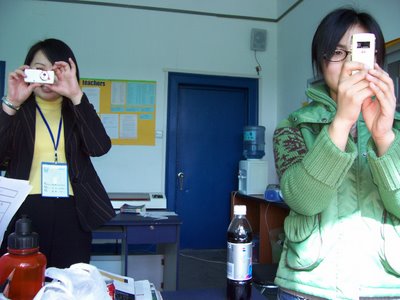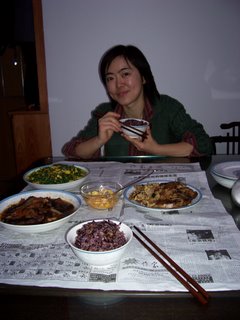Today is International Women's Day. Here in China women (most likely white-collar women) are allowed to leave work at lunch time and have the rest of the day to do as they please. In Russia as reported by the Moscow Times, "On this spring day, representatives of the fair sex will not be punished for minor traffic violations...In some places they congratulate the women drivers, and in other places they even give them small presents such as festive postcards with the traffic police insignia or small bouquets of flowers." I shall hope that I recieve something special today when I venture out to by a textbook for my Chinese lesson for later this week.
 Here is bus on its way to the subway. To get to my lesson I must traverse great distances of concrete and traffice, squeeze my way through multitudes just to stand in the subway train for a rather long time. It takes 1 to 2 hours by subway and bus to get to the Chinese Government Social Welfare Old People's Accomodation (senior citizen's home) On Monday I started my first Chinese lesson with "Tommy." Tommy is a friend of Haiyan and her family in her hometown in Sichuan Province. He is a 79 year old artist who has lived on and off in the U.S. teaching traditional Chinese art in Kansas, California, and Texas. His english is, of course, very good. He wrote a published auto-biography in English, haven't yet asked him about it. Despite the journey, I arrived to his beautiful little senior home among your typical Beijing neighborhood of dirty-looking apartment towers and narrow alleys lined with fruit carts and shops. Tommy's little dorm-style room was lit by a large window and warmed with dark wood furniture and a few of his bronze sculptures. This is "Don't fence me in" He pointed to a 2 foot sculpture of burly man emerging from a pile of rubble holding a spike and chisel. "Do you know?" Then he began to sing very animatedly an American war-era song called "Dont Fence me in." I didn't know it.
Here is bus on its way to the subway. To get to my lesson I must traverse great distances of concrete and traffice, squeeze my way through multitudes just to stand in the subway train for a rather long time. It takes 1 to 2 hours by subway and bus to get to the Chinese Government Social Welfare Old People's Accomodation (senior citizen's home) On Monday I started my first Chinese lesson with "Tommy." Tommy is a friend of Haiyan and her family in her hometown in Sichuan Province. He is a 79 year old artist who has lived on and off in the U.S. teaching traditional Chinese art in Kansas, California, and Texas. His english is, of course, very good. He wrote a published auto-biography in English, haven't yet asked him about it. Despite the journey, I arrived to his beautiful little senior home among your typical Beijing neighborhood of dirty-looking apartment towers and narrow alleys lined with fruit carts and shops. Tommy's little dorm-style room was lit by a large window and warmed with dark wood furniture and a few of his bronze sculptures. This is "Don't fence me in" He pointed to a 2 foot sculpture of burly man emerging from a pile of rubble holding a spike and chisel. "Do you know?" Then he began to sing very animatedly an American war-era song called "Dont Fence me in." I didn't know it.
Tommy will be a good teacher for me. He has offered to help me with anything I should need in Beijing. He has already sought out a local violin shop for me and we will go after the next lesson.
As for the rest of the week I have been busying myself in novelties of my new routine which include: a.) Jogging around the neighborhood to visit the park many older people gather every morning to sing songs in a white stone pagoda, where they can ballroom dance on a basketball court, and where women practice their fan dances, and where random older individuals can perform a series of arm swinging and bending for exercise. b.) Teaching with these girls everyday (Memory and Ann) ...
and generally finding that teaching, despite the occasional yelling, feels rather natural. c.) Haiyan and I have a very nice domestic relationship. (we've actually never gone out anywhere together, because she gets home at 6 30 and after we eat dinner she should usually study for her upcoming PhD entrance exam) . 

We swap cooking dinner for each other. Last night I went all out and made a four course meal for her when she got home.
We sit and have tea in the living room and talk about Chinese stuff.
And on one really fun occasion last week we watched an incredible movie by one of my favorite directors. Its rough translation is "Riding alone for thousands of miles" by director Zhang Yimou. Its my new favorite movie even though I could understand but about 0.9% percent of it. I picked it up at random from a pirated DVD peddler on the street, had no idea what it was about apart from the little boy and older man smilng on the cover. I showed Haiyan and she got rather excited because its title refers to a ancient festival play in Yunnan province (which happens to be my destination of choice when my vacation comes around). It is about a stern and stoic Japanese man who tries to salvage his damaged relationship with his dying son by visiting an actor of this ancient play Yunnan province. Most of the scenes flashed back and forth bewtween the stark urban landscape of a big city in Japan and the snow-capped mountain villages of Yunnan. Its rather funny because the Japanese man cannot speak Chinese, and he is in the backwater of China, which an array of cameras and devices looped around his neck. The film is really about the desire to communicate, both emotionally and physically. The movie's english subtitles weren't existent as promised on the backcover, a problem I usually find with Chinese DVDs, so Haiyan periodically translated it for me, which added a funny extra dimension to our experience watching this movie about people who cannot communicate.
So we have our first date on Friday to see ancient Kunqu Opera, the predecessor to the more famous Beijing Opera. Kunqu is the oldest form of opera in all of China dating back to the 14th century. Its considered more literary, romantic, and technically challenging than most operatic forms because it is the "mother of Chinese opera." It suffered much suppression from the 18th century onward, because audiences were considered to unsophisticated to understand it, then of course in the Cultural Revolution it was almost completely obliterated. Now, the Chinese governement has much interest in preserving it and funds Kunqu opera institutes and promotes its revival. In 2001, UNESCO named it was one of the masterpieces in a global cultural preservation program known as "The Proclamation of Masterpieces of the Oral and Intangible Heritage of Humanity."
This is the website for the 2005 selections. You can see the selections according to regrion on the right. I find it rather entertaining.
